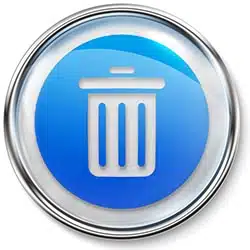It’s a well-known fact that deleting things on your computer usually doesn’t really completely destroy them. So there is definitely some risk in the scenarios that you describe.
Let’s look at each of them.
Become a Patron of Ask Leo! and go ad-free!
Browser cache and history
With respect to Chrome’s history and cache: As with pretty much any browser that you happen to use, history and cache information is just stored in files on your computer. Deleting files on your computer only marks the disk space as unused. It doesn’t overwrite the data. So that means that its possible that the information could be recovered.
Now, I don’t want to make it seem easy. You can’t just flip a switch and recover these files.
It would take data recovery software and some knowledge of exactly what those files are, what they contain, and how they’re constructed, for anyone to actually make use of them. But theoretically, as long as the free area hasn’t been overwritten by other files, it is possible that with some luck and the right tools, the information in those files could be recovered.
 Email
Email
When it comes to emails, the same applies, only with an additional layer of complexity.
It also depends a lot on exactly what email program you’re using.
The information we just covered about your browser cache also applies to webmail. (Webmail uses your browser. Your browser caches things on your hard drive. Thus the email you’ve just been viewing could in fact be in the cache on your hard drive.) There’s no separate email storage on your PC when you’re using webmail.
On the other hand, most email programs actually store the email in some kind of a database on your computer.
What happens when you delete mail depends then on exactly how that particular database software works. For example, Outlook’s PST actually behaves a lot like files on a disk. Emails aren’t actually overwritten; they’re only marked as deleted. Other email programs use files on a disk more directly and once again, the files are deleted, but to Windows that means they’re only marked as deleted and not actually overwritten. Other email programs may do other things.
Really deleting things
When it comes to deleted files, including things like browser caches and perhaps even history, what’s required is something called a secure delete or a free space wipe.
The free space wiper in the free utility CCleaner is one such program. Delete a file, wipe the free space, and the file is effectively gone for good. If you’re worried about NSA levels of data recovery on the hard drive, you may have to overwrite the free space more than once. Free space wipers like CCleaner usually have an option to overwrite the data multiple times.
When it comes to email, on the other hand, there’s really no general rule. Outlook’s PST can be compacted to remove all that unused space that was previously occupied by mail that you deleted. You’ll want to run a free space wiper after having done the compaction to remove the fragments of the PST file that may have been left behind.
Again, for other programs, there’s no general answer. It really depends on exactly how the program stores its data, and what it does when you delete something.

I use a program from Privacy root,prevent restore which deletes all browsing an search history, from disk, and it is free
I was waiting to see if anyone else would mention this, but SSDs are even harder to completely erase than HDs. Most erasing programs just write 1s or 0s in the same space on the hard drive.
From what I’ve read elsewhere, that doesn’t apply to SSDs due to the way they try to balance the use of each block. Instead of writing new data to the same space, it just marks that space as available and writes the new data in another block – which also happens when a file is updated. The only way to erase data is to write something into each available block. Unfortunately that greatly reduces the life of the SSD.
I may be wrong here. If so, please correct me.